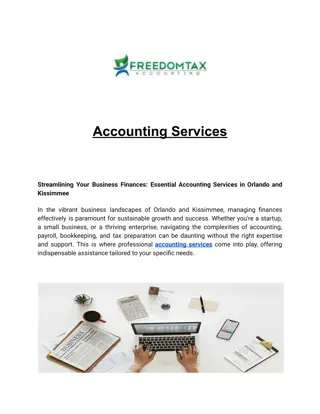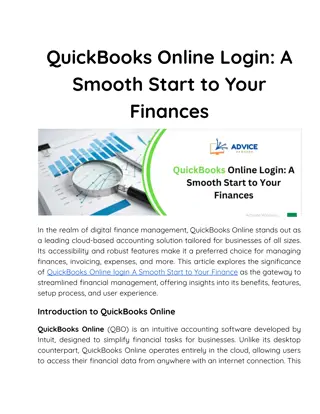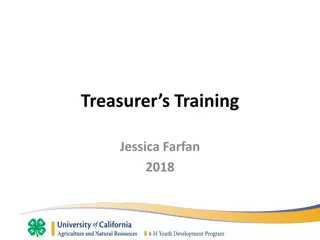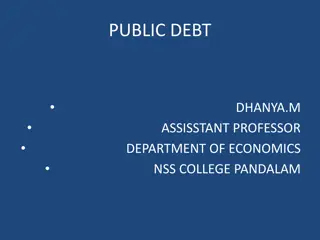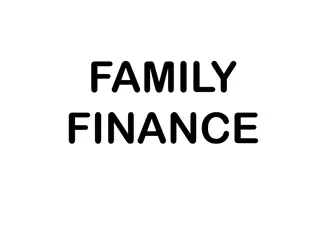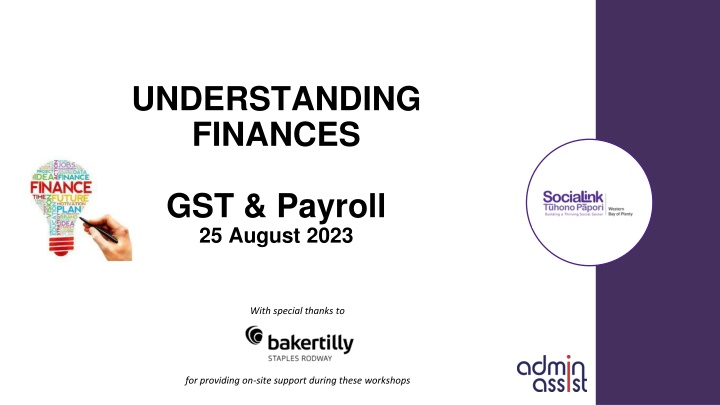
GST Registration, Accounting Basis, and Filing Frequency for Businesses
Learn about GST registration requirements, accounting basis options, and filing frequency guidelines for businesses in this comprehensive guide. Understand when your organization needs to register for GST, how to choose the right accounting basis (Payments, Invoice, Hybrid), and the suitable filing frequency (Monthly, Two-Monthly, Six-monthly) based on your sales turnover. Get clarity on essential financial aspects to ensure compliance and efficiency in managing GST in your business.
Download Presentation

Please find below an Image/Link to download the presentation.
The content on the website is provided AS IS for your information and personal use only. It may not be sold, licensed, or shared on other websites without obtaining consent from the author. If you encounter any issues during the download, it is possible that the publisher has removed the file from their server.
You are allowed to download the files provided on this website for personal or commercial use, subject to the condition that they are used lawfully. All files are the property of their respective owners.
The content on the website is provided AS IS for your information and personal use only. It may not be sold, licensed, or shared on other websites without obtaining consent from the author.
E N D
Presentation Transcript
UNDERSTANDING FINANCES GST & Payroll 25 August 2023 With special thanks to for providing on-site support during these workshops
GST REGISTRATION Your organisation does not have to register for GST just because you have started a business or organisation. You must register if you are an entity and either of these apply to you: you carry out a taxable activity and your turnover was at least $60,000 in the last 12 months, or you expect it will be at least $60,000 in the next 12 months you carry out a taxable activity and you add GST to the price of the goods or services you sell. When you register for GST you choose how often you file your GST returns (your filing frequency) and how you record your GST (your accounting basis). https://www.ird.govt.nz/gst/registering-for-gst
GST ACCOUNTING BASIS Accounting basis What you need to do Who s eligible Most organisations use Payments based Accounting Payments If your total sales are: In your GST return for the period include: $2 million or less in the last 12 months amounts you've been paid by customers likely to be $2 million or less in any 12-month period amounts you've paid to suppliers if you hold taxable supply information. beginning on the first day of a month. Invoice Anyone In your GST return for the period include: amounts you ve notified customers to pay by invoice, even if you have not been paid yet the full sale price amount if customers have paid any amount before you ve invoiced them amounts you ve paid to or been invoiced by suppliers if you hold taxable supply information, even if you have not paid the full amount yet. Hybrid Anyone. Note: This method is not commonly used by small businesses because of negative cashflow consequences. This is because you may return GST on invoiced sales before you have received payment, but you can only claim GST when you have paid for your purchases (not when invoiced). Use the invoice basis for your sales. Use the payments basis for your expenses. Source: https://www.ird.govt.nz/gst/registering-for-gst/which-gst-accounting-basis-and-filing-frequency-should-i-use
GST FILING FREQUENCY Filing Frequency Who s eligible Who it s suitable for Monthly Anyone. Customers likely to get regular GST refunds. You must file monthly if your sales are over Most organisations use Two-Monthly Filing Frequency $24 million in any 12-month period. For a GST group the $24 million applies to the group as a whole. Two-monthly Anyone with sales under $24 million in any 12- Customers who find regular filing helps them keep on top of month period. paperwork. For a GST group the $24 million applies to the group as a whole. Six-monthly Anyone with sales under $500,000 in any 12- Customers with few sales and purchases. month period. You only need to file two returns a year but it can be a big job to For a GST group the $500,000 applies to the account for six months' worth of trading in one go. group as a whole. Source: https://www.ird.govt.nz/gst/registering-for-gst/which-gst-accounting-basis-and-filing-frequency-should-i-use
INVOICES (Accounts Receivable) Below is a summary of how GST is applied to Income: Grants Contracts Donations Other Income Interest Sale of goods must include a GST component if the group is GST registered Generally Grants are exclusive of GST GST is added to contract amounts No GST on Donations received No GST on Interest Income Groups GST Registered Training / workshop fees or registrations must include a GST component if the group is GST registered Generally Grants will include GST Groups Not GST Registered Record the Gross amount received
INVOICES (Accounts Payable) Below is a summary of how GST is applied to Expenses: Bank Fees Contractors Koha / Donations Mileage Reimbursements Wages Bank fees do not have GST GST is No GST on Koha / Donations made to individuals or organisations. No GST on mileage reimbursement GST is applicable only if the supplier is GST registered and you have a GST invoice / receipt No GST on wages applicable only if the Contractor is GST registered Groups GST Registered Vouchers - generally there is no GST. Check the receipt when processing Groups Not GST Registered Record the Gross amount payable /paid
BILLS (Accounts Payable) GST Number displayed Dated Word Tax Invoice included GST amount included
BILLS (Accounts Payable) No GST Number displayed If the Supplier is not GST Registered No GST number required No GST charged Not registered for GST should be recorded Dated Word Tax Invoice included If the Supplier is GST Registered GST number required on bill GST charged on bill GST amount charged but no GST number recorded on the invoice received
RECEIPTS Vouchers generally do not have a GST component. The receipt will confirm if GST is included or not. Example # Non-Taxable items EFTPOS receipt No GST Number Not a Tax Invoice GST Number provided Tax Invoice printed
ORDER CONFIRMATION No GST number Although the GST amount is shown GST can t be claimed as the suppliers GST number is not provided. In this instance ask the supplier to provide a GST Invoice / Receipt
ORDER CONFIRMATION GST number is included Invoiced to the organisation
XERO TIME SAVING TIPS Xero Dashboard Contacts / Finance details Then select edit followed by Purchase defaults Customise financial details for this contact for consistency and time saving You can also set up defaults for Tracking Categories you have set up for consistency and time saving
XERO FILING GST RETURNS Xero Dashboard Accounting / GST Return Return due now - displays due date and how long left to file your return with the IRD Check to see GST DUE or PAYABLE for the current period
XERO GST RETURN CHECKLIST 1. Check transactions in GST Audit Report to ensure GST has been allocated correctly Click on the blue text to go to the individual transaction to check details and update GST allocation if needed 2. Once you are happy that GST has been allocated correctly for all transactions in the period the return is being filed for: Export a copy of the GST return to PDF Save and select Final 3. Option at the top of your screen to file with IRD, click and enter your organisations MyIR username and password 4. Select Publish to complete the filing of your GST Return
EXCEL CASHBOOK & GST If you don t have accounting software you may prefer to keep a manual record of your income and expenses and also GST SAMPLE Excel Template from IRD website downloaded & will be emailed to attendees
PAYROLL Own Payroll System / Records IRD filing required depending on system used Use accounting packages like Xero to help manage payroll Manual calculations may be required for Holiday Pay i.e. Gross Earnings X holiday pay % PAYE Intermediary A PAYE Intermediary engages with the IRD on your behalf and assists your organisation to fulfil your legal obligations as an employer. These services generally include: Filing your employee information forms. Paying IRD the deductions made from your employees pay each month. Resolving queries with IRD Software that use employee start date and payroll records to calculate an employee leave availability PAYE Intermediaries can be payroll software providers, accountants or tax agents. Charities - Some Intermediaries charge a standard rate for their services and others offer discounts or free services
PAYROLL What Own Systems / Records PAYE Intermediary Payroll filing You must file an employment information form every time you pay your employees. This is based on the date you pay employees (pay day) and may be weekly, fortnightly, monthly or more often if you have multiple paydays. File your employee information forms Pay IRD the deductions made from your employees pay each month Filings completed by due date Electronic filing must be within 2 working days of each day pay, paper filing within 10 working days. Managing leave Manual calculations may be required for Holiday Pay i.e. Gross Earnings X holiday pay % Accurate record of all types of leave. Also helps to manage Annual Leave liability Record keeping May mean record keeping for various sources History, audit trail of payroll Employee Interaction Varies depending on how manual your payroll system is and which accounting software is used Payslips can be emailed, most have apps
Xero PAYROLL ADDITIONAL COST FOR PAYROLL Starter, Standard & Premium Plans: Additional $10 + GST per month Xero Me Gives access to your employees to view payslips, request leave, or submit timesheets with Xero s payroll system for your small business. ADDITIONAL COST FOR CLAIM EXPENSES Standard & Premium Plans: Additional from $5 + GST per user Note: Claim Expenses not available for Starter Plan. https://www.xero.com/nz/accounting-software/payroll/
PAYE INTERMEDIARIES There are many PAYE Intermediaries to choose from, here is a selection that integrate with Xero Cost varies depending on how many people you have to pay and how often you pay your employees From $19.90 per month for up to 5 employees for Self Service package From $2 per employee / month $4 per employee / month including reporting, accounting integration 10% off payroll subscription and 50% off data transfer costs, and free training sessions for Charities Free payroll offered for Charities https://www.thankyoupayroll.co.nz/payroll- for-charities/ https://employmenthero.com/nz/pricing/?pri cing-tab=payroll https://crystalpayroll.com/pricing/
THANKYOU PAYROLL Things I like about Thankyou Payroll: 1. No fees for Charities 1. Xero integration 1. Time-saving default payruns (it takes 5 - 10 minutes to process payroll) 1. Same day phone and email support from NZ based payroll experts plus good online help and resources 1. Compliance with IRD 1. Thankyou Payroll invests a portion of its profits into Thankyou Payroll Charitable Trust which distributes funds to organisations across NZ 1. Allows for Payroll Giving 1. APP for staff to use to access current leave availability etc
USEFUL RESOURCES Payroll Software vs PAYE Intermediaries (video) https://www.youtube.com/watch?v=iNeKzvgsrKo Thankyou Payroll https://www.thankyoupayroll.co.nz/payroll-for-charities/ Inland Revenue https://www.ird.govt.nz/gst https://www.ird.govt.nz/employing-staff Xero Payroll https://www.xero.com/nz/accounting-software/payroll/
FINAL UNDERSTANDING FINANCES WORKSHOP Annual Financial Statements 22 September, 10am - 12pm



